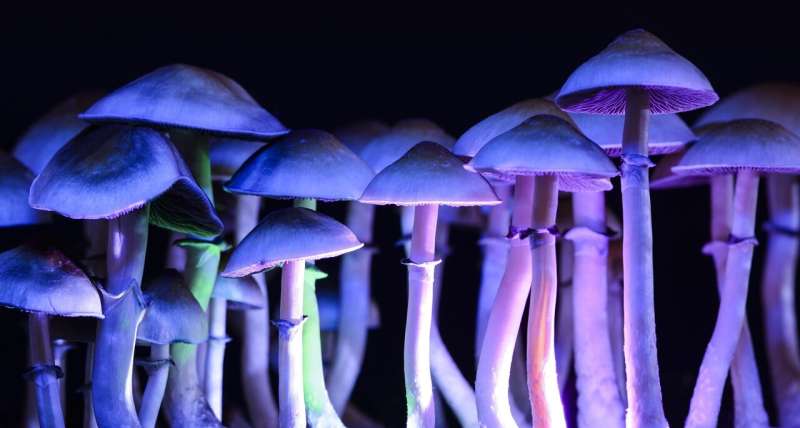This article has been reviewed according to Science X's editorial process and policies. Editors have highlighted the following attributes while ensuring the content's credibility:
fact-checked
peer-reviewed publication
trusted source
proofread
New study provides further support for psilocybin's potential to treat depressive symptoms

High doses of psilocybin—the active ingredient in magic mushrooms—appears to have a similar effect on depressive symptoms as the selective serotonin reuptake inhibitor (SSRI) drug escitalopram, suggests a systematic review and meta-analysis published in The BMJ today.
The findings show that patients treated with high dose psilocybin showed better responses than those treated with placebo in antidepressant trials, although the effect size was small.
The researchers point out that flaws in study designs may have overestimated the effectiveness of psychedelics, but say high dose psilocybin "appeared to have the potential to treat depressive symptoms."
Psychedelic treatment has shown promise in reducing depressive symptoms. However, only one randomized controlled trial has so far directly compared a psychedelic drug (psilocybin) with an antidepressant drug (escitalopram) for patients with major depressive disorder.
What's more, the subjective effects of psychedelic substances can compromise blinding, leading to overestimation of treatment effects compared with placebo. Psychedelic treatment is also usually given with psychological support which makes isolating the direct effects of psychedelics difficult.
To try and address these issues, the researchers trawled scientific databases to identify randomized controlled trials published up to 12 October 2023 that assessed the effects of psychedelics or escitalopram in adults with acute depressive symptoms.
To be eligible, psychedelic treatment (including MDMA, LSD, psilocybin, or ayahuasca) had to be given orally with no additional use of antidepressants, while escitalopram trials had to compare at least two different oral doses (maximum 20 mg/day) with placebo. Trials comparing psychedelic therapy directly with escitalopram were also included.
Overall, 811 people (average age 42; 54% women) were included in 15 psychedelic trials and 1,968 people (average age 39; 63% women) were included in five escitalopram trials.
Effect size was expressed as a standardized mean difference (0.2–0.5 indicates a small effect, 0.5–0.8 a moderate effect, and 0.8 or more a large effect).
The researchers found that placebo responses in psychedelic trials were lower than in escitalopram trials. As a result, while most psychedelics performed better than placebo in psychedelic trials on the 17 item Hamilton depression rating scale (HAMD-17), only high dose psilocybin performed better than placebo in escitalopram trials on the HAMD-17 scale, showing a small effect size (standardized mean difference 0.3), which is similar to that of current antidepressant drugs.
None of the interventions was associated with a higher rate of severe adverse events (including death, admission to hospital, or suicide attempt) or discontinuation than placebo.
The authors acknowledge several study limitations, including that only acute effects of the interventions were assessed and that the long term effects of psychedelics and escitalopram remain unclear. The sample size of the psychedelic trials was small, they add, and the effects of high dose psilocybin may have been slightly overestimated compared with other treatments.
Nevertheless, they conclude, "Serotonergic psychedelics, especially high dose psilocybin, appeared to have the potential to treat depressive symptoms. Our analysis suggested that the standardized mean difference of high dose psilocybin was similar to that of current antidepressant drugs, showing a small effect size."
They add, "Improved blinding methods and standardized psychotherapies can help researchers to better estimate the efficacy of psychedelics for depressive symptoms and other psychiatric conditions."
More information: Comparative oral monotherapy of psilocybin, lysergic acid diethylamide, 3,4-methylenedioxymethamphetamine, ayahuasca, and escitalopram for depressive symptoms: systematic review and Bayesian network meta-analysis, The BMJ (2024). DOI: 10.1136/bmj-2023-078607



















